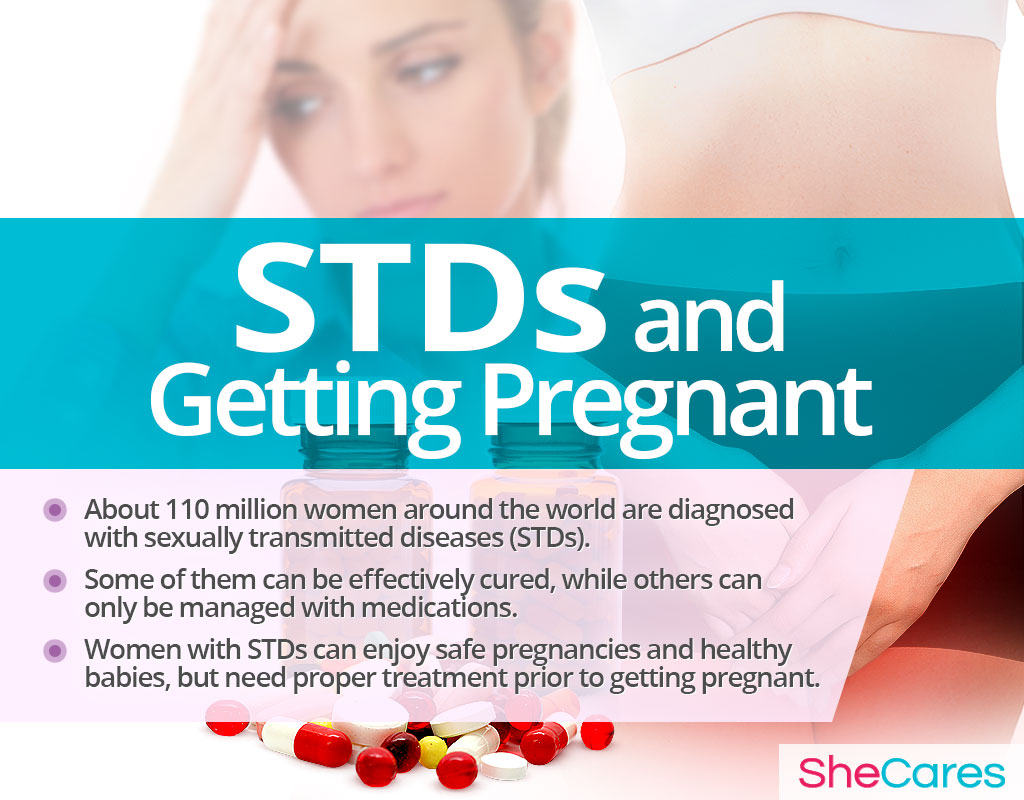Brief Overview of STDs
As the name indicates, this group of diseases is transmitted through sexual intercourse or an intimate skin-to-skin contact. STDs, also referred to as sexually transmitted infections (STIs), can be caused by various pathogens, such as viruses, bacteria, or parasites.
There are eight most common STDs, which might bring about a wide range of symptoms or be asymptomatic. They can be categorized as follows:
STDs that can be cured with antibiotics:
- Chlamydia, syphilis, trichomoniasis, and gonorrhea.
STDs that cannot be cured, but can be managed with antiviral drugs:
- Herpes simplex virus (HSV), human immunodeficiency virus (HIV), hepatitis B (HBV), and human papillomavirus (HPV).
Possible Effects of STDs on Pregnancy
Effects of STDs on Fertility
Untreated STDs might lead to pelvic inflammatory disease (PID), an inflammation and scarring of the reproductive tract, which might cause:
Tubal Factor Infertility (TFI) results from damage to the fallopian tubes, which blocks the path of the egg and prevents fertilization.
Endometriosis is a painful condition, known for causing infertility and triggering early menopause.
Ectopic pregnancy can result from an extensive damage to the fallopian tubes and might stop you from getting pregnant.
Effects of STDs on the Mother and Baby
Most commonly, STIs are transmitted from mother to baby during labor and delivery, but some, like HIV or syphilis, can cross the placenta and infect the baby in the womb during pregnancy.
If left unmanaged, they can have serious effects on the baby's health and development, including neonatal conjunctivitis, blindness, deafness, pneumonia, low birthweight, meningitis, and brain damage.
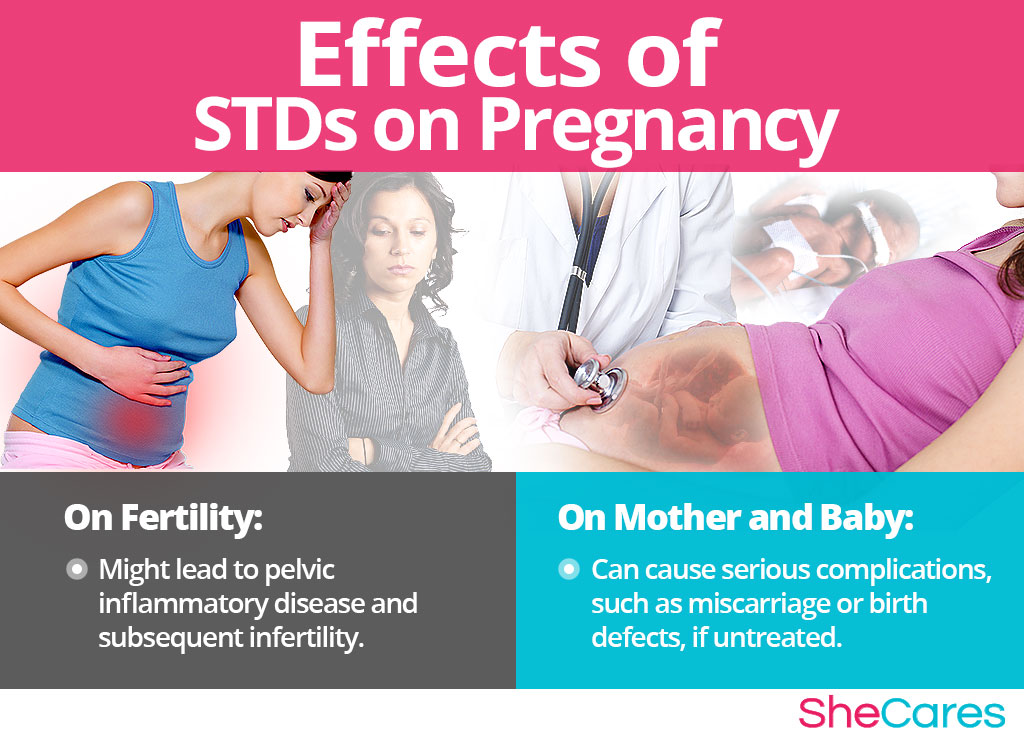
Risks and Complications
Untreated STDs during pregnancy can result in miscarriage, stillbirth, or preterm labor.
Action Plan
Treat STDs before Pregnancy
The goal before getting pregnant is to treat or manage STDs and restore your fertility. The faster you get treated, the lesser the effect STDs will have on your ability to have children and your overall health.
Testing and Treatment
An infection with two different STDs are quite common and might significantly worsen pregnancy outcomes if overlooked. Treatment approach depends on the type of STD you have:
- Antibiotics are used to treat chlamydia, syphilis, gonorrhea, and trichomoniasis.
- Antivirals are prescribed to suppress viral replication of HIV, HSV, HPV, and Hep B.
Healthy Diet
Build your meals with foods that can strengthen your immune system and enhance your fertility. They include:
Foods with antibacterial, antiviral, anti-parasitic properties: garlic, honey, ginger, cinnamon, and turmeric
Immunity boosters: oranges, sunflower seeds, almonds, and spinach
Probiotics: yogurt, kefir, and kombucha
Antioxidant-rich foods: berries, cilantro, and pecans
Phytoestrogenic foods: broccoli, nuts, beans, and whole grains
Adequate Exercise
Regular exercise provides numerous benefits. It can boost your fertility, support your immune system in fighting your STD, and reduce stress so you can prepare for motherhood more effectively.
- Avoid strenuous exercises as it can diminish your fertility, and focus on low-impact exercises, such as swimming, running, and dancing.
Vitamins and Supplements
Hormone-regulating supplements, like Macafem, can regulate your reproductive hormones, enhance ovulation, and increase your chances of conception.
Prenatal vitamins with folic acid and iron are best started three to six months before conceiving to improve fertility and prevent birth defects.
Other supplements, such as Vitamin C, E, B-complex, beta-carotene, can help you manage STDs as they improve the immune system as well as reproductive function. Lysine is a known remedy for genital herpes.
Good Habits
It is imperative for your partner to get tested and treated as well to prevent subsequent infection.
Quit your addictions to alcohol and cigarettes before getting pregnant in order to boost your fertility and prevent complications later on.
Review your medications and supplements with your doctor to make sure they can be continued during pregnancy.
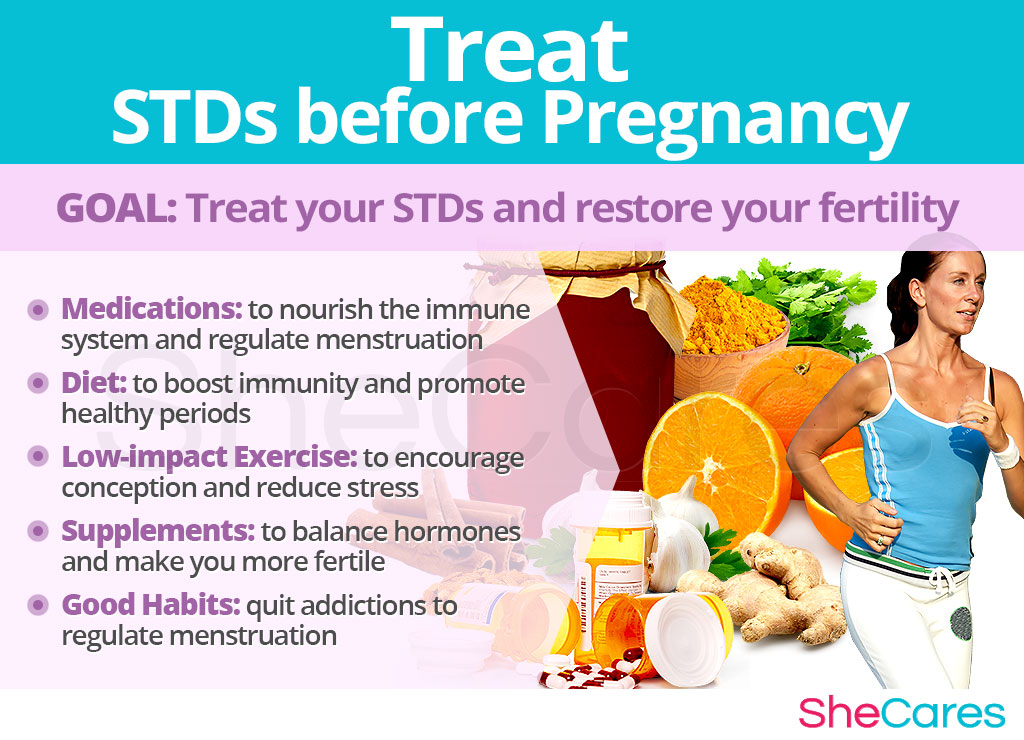
Tips for Conceiving with STDs
Prolonged stress is known to negatively affect fertility and suppress immunity. So, as you are trying to get pregnant, focus on the following:
Surround yourself with a group of reliable friends and family members for emotional support.
Find your optimal ways to unwind and relax, such as meditation, a new hobby, or dancing.
If you suffer from genital herpes, do not attempt to conceive during an outbreak.
Sleep seven to eight hours a day to help your body fight off infections.
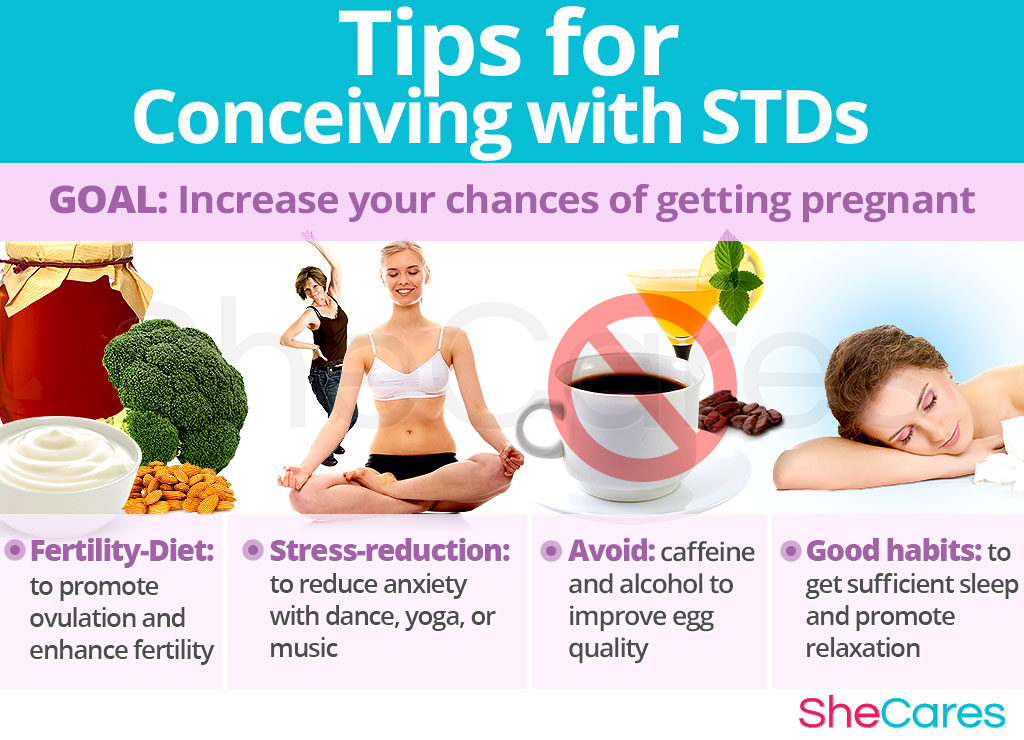
Manage STDs during Pregnancy
If your partner has an STD, use condoms or abstain from all forms of sexual contact, including oral, anal, and vaginal sex during your pregnancy.
Try prenatal yoga to reduce stress and relieve muscle aches during pregnancy.
Continue good habits from preconception, such eating a balanced diet and exercising, and watch out for warning signs complications, such as fever, severe pain or nausea, or bleeding.
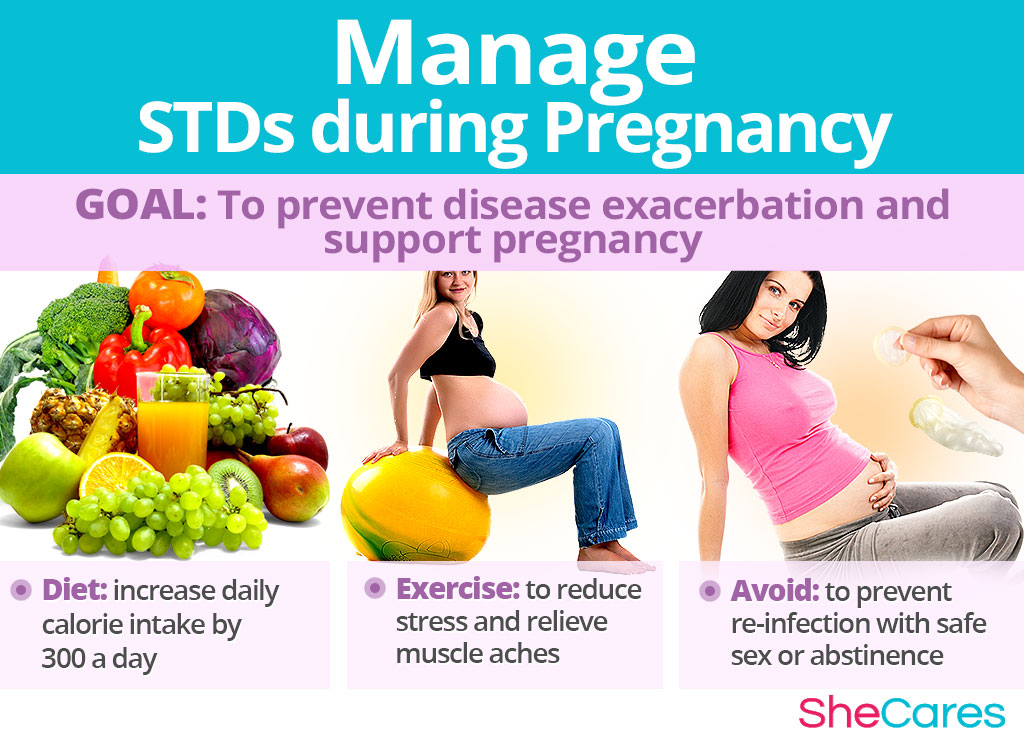
Key Takeaways
Understandably, preparing for pregnancy with a sexually transmitted disease can be quite scary. STIs, like other infections, thrive in bodies that are weak. So, any efforts to strengthen the immune defenses through a healthy diet, exercise, and supplements, like Macafem, can reduce the effects of STDs on your and your baby's health. Whether your STI is curable or not, a prompt diagnosis and an effective management plan can bring the risk of complications during pregnancy down to zero and enable you to become a mother of a healthy infant.
Sources
- CDC. (2017). Chlamydia. Retrieved December 19, 2017 from https://www.cdc.gov/std/chlamydia/
- CDC. (2017). Gonorrhea. Retrieved December 19, 2017 from https://www.cdc.gov/std/gonorrhea/stdfact-gonorrhea.htm
- CDC. (2017). Syphilis. Retrieved December 19, 2017 from https://www.cdc.gov/std/syphilis/default.htm
- Health Direct. (n.d.). Sexually transmitted infections. Retrieved December 19, 2017 from https://www.healthdirect.gov.au/sexually-transmitted-infections-sti
- Mayo Clinic. (2015). STDs and pregnancy: Get the facts. Retrieved December 19, 2017 from https://www.mayoclinic.org/healthy-lifestyle/pregnancy-week-by-week/in-depth/stds-and-pregnancy/art-20115106?pg=1
- PLOS. (2014). Why Sexually Transmitted Infections Tend to Cause Infertility: An Evolutionary Hypothesis. Retrieved December 19, 2017 from https://www.ncbi.nlm.nih.gov/pmc/articles/PMC4125283/
- The Fertility Society of Australia. (n.d.). Sexually transmitted infections (STIs). Retrieved December 19, 2017 from https://yourfertility.org.au/Sexually-transmitted-infections-STIs.pdf
- Women's Health. (n.d.). Sexually transmitted infections, pregnancy, and breastfeeding. Retrieved December 19, 2017 from https://www.womenshealth.gov/a-z-topics/stis-pregnancy-and-breastfeeding
